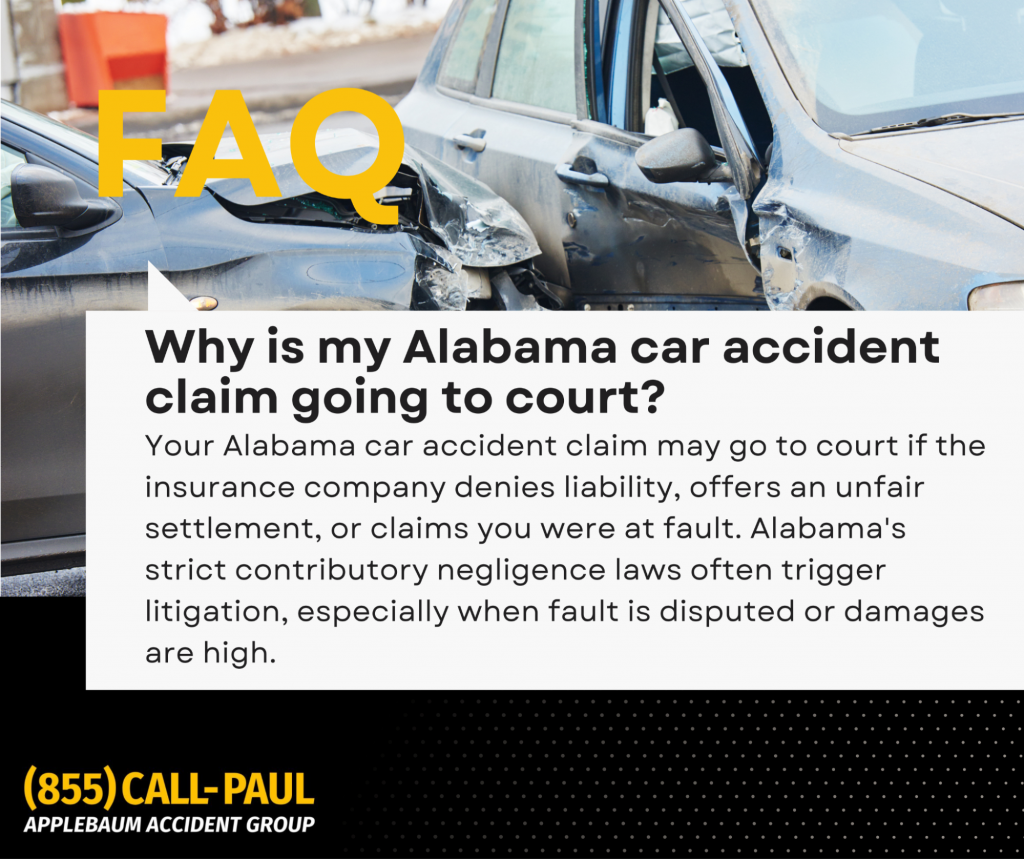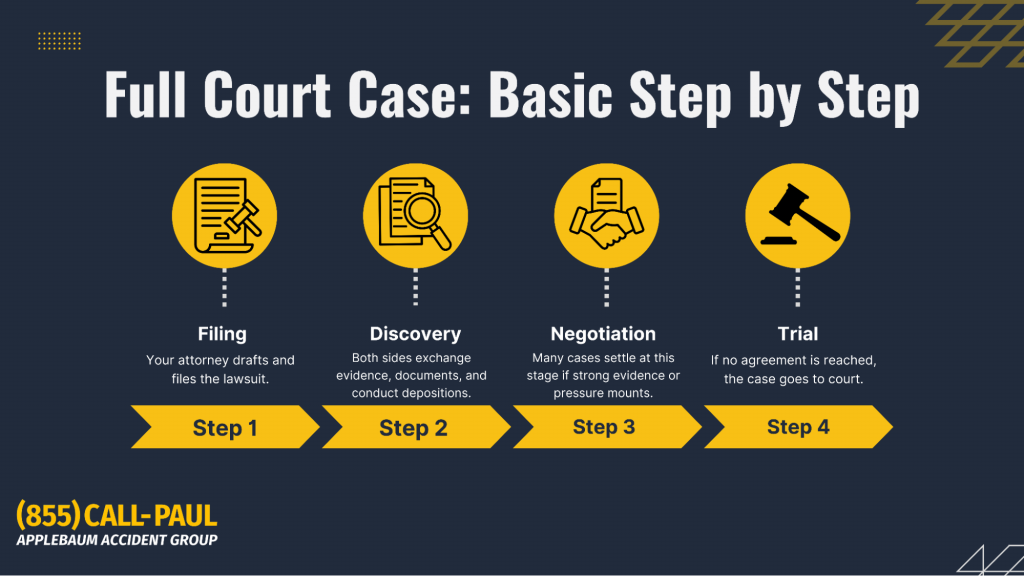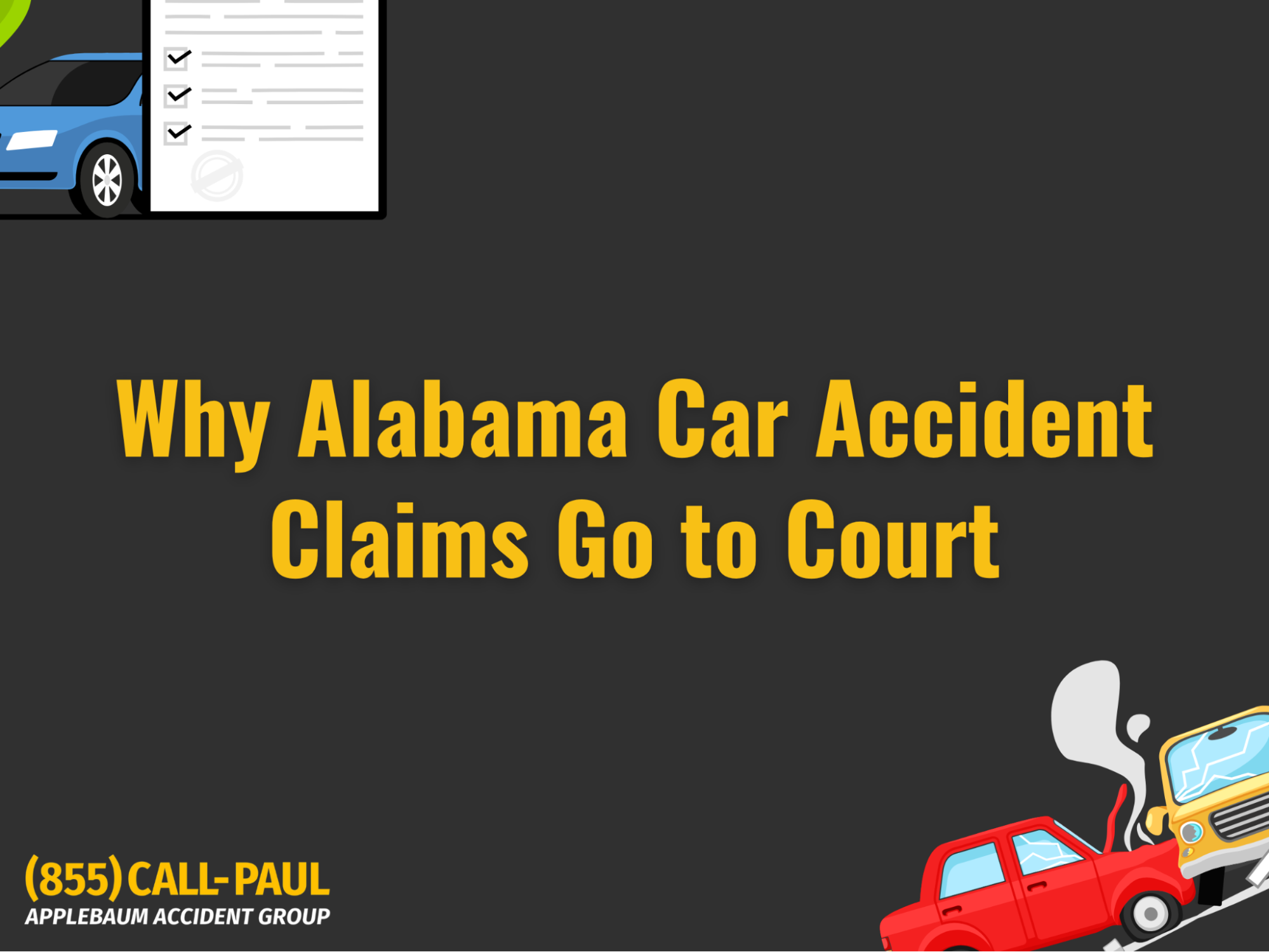Your Alabama car accident claim may go to court if the insurance company denies liability, offers an unfair settlement, or claims you were at fault. Alabama’s strict contributory negligence laws often trigger litigation, especially when fault is disputed or damages are high.

You expected a payout, now you’re heading to court. Why?
This article breaks down:
- How Alabama’s “all or nothing” fault system shapes claims
- The tactics insurers use to delay or reduce your compensation
- What deadlines and steps you need to know
- How to avoid the traps that force cases into court
Whether you’re the one suing or being sued, you’ll get a clear roadmap forward.
Why Alabama Car Accident Claims End Up in Court
Even though most car accident claims in Alabama settle, there are several reasons yours might not:
- Disputes over who caused the crash , if both parties point fingers, neither insurer wants to pay.
- Insurance denies liability or delays payout , dragging things out or offering pennies on the dollar.
- Lowball settlement offers , especially for long-term injuries or future costs.
- High-cost injuries with long-term treatment , insurers resist paying out on injuries like spinal damage or traumatic brain injury.
- Total loss disputes , when the insurer pays actual cash value (ACV) but the replacement cost is much higher.
- Fault disagreement even with a police report , some insurers ignore reports and rely on internal fault metrics.
It’s frustrating to hear this, but we’ve seen firsthand: even crystal-clear evidence doesn’t always stop an insurer from claiming shared blame to reduce what they owe. That’s when court becomes the only option left.
Alabama Is a Pure Contributory Negligence State
Alabama stands alone in how harsh its rules are. If you’re found even 1% at fault, you lose the right to any compensation. There’s no middle ground, no 50/50 split, no partial payout.
This rule pressures many injured drivers into litigation, even when the other driver is clearly at fault, because the insurer only needs to convince a jury (or adjuster) that you share any blame to deny your claim entirely.
And they try. We’ve heard from people who were told they were 25% at fault, even with dashcam video and a police report backing them up.
Why does this happen? Because insurance companies know this 1% rule is a powerful tool. They use it to:
- Shift blame when evidence is unclear
- Deny claims outright without negotiating
- Pressure people into accepting low settlements
If your claim is in court, it could be because the insurer is betting they can convince a judge or jury that you’re even slightly at fault.
How Long You Have to Sue & What Timeline to Expect

In Alabama, you have two years from the date of the accident to file a lawsuit. Miss that window, and your right to sue is gone, even if the facts are on your side.
If you’re only dealing with property damage or seeking reimbursement for things like rental costs, you might qualify for small claims court. This can be faster, but still requires clear documentation and persistence.
Here’s a basic timeline of what a full court case might look like:
- Filing – Your attorney drafts and files the lawsuit.
- Discovery – Both sides exchange evidence, documents, and conduct depositions.
- Negotiation – Many cases settle at this stage if strong evidence or pressure mounts.
- Trial – If no agreement is reached, the case goes to court.
Even after trial begins, it’s not over. Cases can still settle mid-trial if both parties reach a deal, often because one side sees the risk of losing.
FAQ: How long do most car accident settlements take?
Expect a range from three months to over two years. Quick settlements usually happen when fault is obvious and injuries are minor. More serious cases with disputed liability or major medical costs take longer, especially if court becomes necessary.
Common Delays & Insurance Tactics That Lead to Court
One of the most frustrating realities for accident victims in Alabama is how aggressively insurers drag their feet. When they’re not outright denying a claim, they often delay it long enough to test your patience, or pressure you into giving up. Here are some of the most frequent tactics that land claims in court:
- Unexplained delays , adjusters stop responding, stretch out timelines, or claim they’re still “investigating.”
- Refusing to adjust fault even with dashcam or video proof , many drivers assume video footage will force the insurer’s hand. Often, it doesn’t.
- Undervaluing lost income or long-term medical care , especially common for freelancers, business owners, and physically active professionals.
- Denying rental reimbursement , a tactic that adds financial stress and makes injured drivers more willing to settle for less.
Despite clear police reports or multiple witnesses, some insurers will still stand by their original fault determination. We’ve seen drivers shocked when adjusters ignored black-and-white facts. When that happens, the courtroom is the only place left to challenge the outcome.
Real Examples of When Claims Go to Court
Claims don’t escalate without cause. Here are real-world examples that show how the system can break down, and why filing a lawsuit becomes the only option:
- Case 1: Hospital lien and long-term treatment
A driver suffered a spinal injury requiring ongoing care. The insurer delayed settlement for over a year. Meanwhile, the hospital placed a lien on the future payout. With no financial relief in sight, the driver filed suit to recover enough to cover both treatment and outstanding bills. - Case 2: Partial fault alleged without evidence
A woman rear-ended at a stoplight was told she was “partially at fault” for braking too suddenly. The police report cleared her. The insurer still denied the full claim. Her only choice was to take it to court to challenge the fabricated liability. - Case 3: Lowball offer for a serious injury
After a major side-impact crash, the insurer offered just $5,000 for what turned out to be $30,000 in damages. With clear medical documentation and repair costs, the victim turned to legal action to pursue the difference.
These scenarios aren’t rare. They’re what happens when everyday drivers try to work within a system designed to minimize payouts, not protect victims.
Alabama’s Fault Law Explained
Alabama is not a no-fault state. That means you’re not filing a claim with your own insurance company, unless you have specific add-ons like MedPay or Uninsured Motorist coverage. Instead, claims are made against the at-fault driver’s policy.
And here’s where things get more complicated: if the at-fault driver doesn’t carry enough insurance to cover your losses, you may have to sue them personally.
That’s right, after dealing with injuries, medical bills, and repairs, you could end up filing a personal lawsuit against another driver just to recover what the insurance policy couldn’t cover.
FAQ: How long does an at-fault accident stay on your record in Alabama?
Typically, an at-fault accident stays on your Motor Vehicle Report (MVR) for up to five years. This can impact your insurance premiums, even if your case goes to court and results in a favorable verdict.
What to Do If You’re Being Sued or Want to Sue
Whether you’re the one pursuing a lawsuit, or the one being served, it’s critical to act fast and smart. Here’s how to protect yourself on either side of the legal battle:
If You’re Filing a Lawsuit
- Gather all evidence , medical records, crash photos, repair estimates, and any video footage.
- Know your deadline , in Alabama, you only have two years to file a lawsuit from the date of the accident.
- Don’t rely only on police reports , get witness statements or dashcam evidence to strengthen your position.
If You’re Being Sued
- Notify your insurer immediately , delay here could void your coverage.
- Understand the financial risk , if the verdict exceeds your policy limits, you could be on the hook for the rest.
- Bankruptcy, wage garnishment, or asset seizure are real outcomes in large verdicts.
While Alabama law may require you to sue the other driver personally if their insurance coverage isn’t enough, Florida also faces this issue. See What Happens When Car Accident Claim Exceeds Insurance Limits In Florida for a broader look at cross-state challenges.
Real Concern: “Can they take my savings if I lose?”
The short answer: yes, they can. If you’re found liable and the judgment exceeds your coverage, your personal assets may be at risk. That’s why legal protection and a proactive strategy matter, whether you’re at fault or not.
What Court Really Means (and Doesn’t Mean)
A lawsuit doesn’t always lead to a dramatic courtroom showdown. In fact, many claims settle after a lawsuit is filed and sometimes even during trial. Filing a case often adds enough pressure for insurers to improve their offers, especially when they see the claimant has legal representation and strong evidence.
Still, going to court is a serious decision.
- Trials may help increase compensation, especially for high-damage or long-term injury claims.
- Verdicts are public record. That can be helpful if you win, but risky if you don’t.
- The emotional and financial toll of litigation can’t be overlooked. Some people seek closure or justice; others just want to move on. Either way, it’s a path to consider with guidance.
FAQ: Will going to court erase the at-fault label from my record?
Only if the verdict overturns the fault determination. If a judge or jury rules in your favor, it can clear your name, though you’ll need to work with the DMV and insurer to update your record.
What You Can Do Right Now
If your Alabama car accident claim is heading to court, you’re not alone, and you’re not powerless.
- Document everything. From medical visits to car repair estimates, every record matters.
- Don’t accept blame without review. Even if the insurance company says you’re 1% at fault, that might not hold up in court.
- Talk to someone who understands Alabama law inside and out.
You only get one chance to get this right.
The Right Help, Right Now: Applebaum Accident Group

If you’re here, chances are you didn’t expect your car accident claim to turn into a legal fight. But when insurers deny fault, delay payout, or refuse to be fair, you need more than just a lawyer, you need a network that knows how Alabama works.
Applebaum Accident Group is built for this. Here’s how we help:
- We connect you with attorneys who know Alabama’s contributory negligence law inside and out. No learning curves. No wasted time.
- We help you avoid the traps insurers use to block or undercut claims. From shifting blame to minimizing injuries, we’ve seen it all, and we’ve built relationships with legal teams that don’t fall for it.
- We’re not a law firm. We’re your referral partner. That means our only job is to match you with the right lawyer for your case, not to bill you or take shortcuts.
If your claim is being challenged, delayed, or forced into court, we’ll put you in touch with the legal help you need, fast, fair, and with your future in mind.
👉 Contact Applebaum Accident Group today and get the help you deserve.





